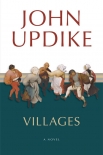Villages by John Updike (best summer reads of all time .TXT) 📗

- Author: John Updike
Book online «Villages by John Updike (best summer reads of all time .TXT) 📗». Author John Updike
Shadows were lengthening. The air was turning chilly. Vanessa, who as co-chairperson had already given an efficient speech of many-sided thanks into a defective, squawking portable sound system, came up to him. She wore a teal-green shot-silk pants suit and had at her side a handsome man in a reversed collar. “Owen dear, I’m not sure you’ve met the Reverend Mister Arthur Larson. He’s rather new at Epiphany Episcopal but was a splendid help with the special contributors in his flock. He helped us pin them down.”
The clergyman shook Owen’s hand. His grip would be, Owen intuited, exquisitely adjusted to the gender and size of the gripped, to his or her economic significance in the town, and to the strength of the presumed friendship with influential Vanessa. Owen received a warm but not fervent squeeze. Reverend Larson’s handsomeness seemed something evenly sprayed on, a water-resistant layer of it, from the satin shine on his narrow black shoes to the leathery lustre of his wind-buffed face, that of a weekday outdoorsman. The shirt beneath his collar was not the usual sooty black but a suave dove-gray; the thick hair on his head reminded Owen, in its resilience and tightly matted knit, of some middle-sized, tufty-backed, curly-tailed dog. Larson was still in his thirties, and firm but unassuming in demeanor. This was a man whose way was secure within the Lord’s way.
“Owen,” he said, repeating the name from Vanessa’s introduction, as if fixing it to a roll of remembrance in his mind. His eyes were kindly glints bracketed by the beginnings of creases. Owen liked him; he liked most clergy, for holding off the unthinkable while we dally through life.
Larson moved a half-step to the side, revealing a woman with him, who had tactfully lagged behind, on the other side from Vanessa. She was compact and silken, like Elsie, with a touch of double chin, but also radiated the inscrutable, somewhat humorless vitality Owen had last admired in Ginger Bitting. Her handshake startled him, those fine female fingers coolly sliding into his palm. Her eyes were the sharp aquamarine of, in Willow, the tinted wineglasses and scallop-edged little glass candy dishes that houseproud aunts and elderly female neighbors would set on the locked upper edge of the lower window sash to catch the light. In his schooled and preening baritone, dipping a bit deeper into his chest than mere communication demanded, the other man announced to Owen, “And this is my good wife, Julia.”
xiii. You Don’t Want to Know
In Haskells Crossing, people die. They show you how to do it. They do it out of sight, among professional nurses and faithful retainers usually, though in rare instances they drop dead without warning while, say, pushing up the hill on the thirteenth hole, or in the middle of a nap after a boozy Sunday lunch. Death never loses its quality of unexpectedness. Life does not expect it; the living mind cannot conceive of it. Some citizens die soon after elaborate cosmetic surgery, or a difficult multiple-bypass operation, or an expensive house renovation, preparing for the years ahead; they die regardless.
In church, which Owen and Julia attend regularly, though for her less regularly than when she was a clergyman’s wife, the process can be seen at work. The dying, Sunday after Sunday, are by increments more hesitant and emaciated as they totter back from the communion rail with defiant eyes and munching jaws. Next, they can no longer make it to the communion rail, or cannot kneel, because of a dropsical knee or an excruciating hip, and take the wafer into their lips standing up, like Roman Catholics or Lutherans, or else—the next stage—the minister and his acolyte bring it to them afterwards in the pews. At this break in the customary ceremony there is no other sound than that of the minister murmuring, no other motion than that of the communicant’s shaky white head bobbing and her hand, if she is of the old high-church school, making the sign of the cross after receiving the wafer and wine. The men lose color in their faces, turning a stony gray as their eyes sink in the sockets; the women, who even in life’s last stages can draw upon the fleshy tints of makeup, show a glittering gaze above withered but ruddy cheeks. Dying flatters some women, highlighting the austerity and doughtiness that were always theirs. Others, like remarkably rich Florence Sprang, appear as painted, overdressed grotesques hobbling up the aisle between a cane and a retainer to receive their portion of the body and blood of Jesus Christ.
Finally, even the most stoic and determined communicant cannot make it to Sunday service and is present there only as a name in the Prayers of the People, as one of the many—too many, it is whispered—names read in a flat voice by the day’s leader, after the formula For the aged and infirm, for the widowed and orphans, and for the sick and the suffering, let us pray to the Lord. Or, in Form III, Have compassion on those who suffer from any grief or trouble. In the drone of names that follows, “Florence” democratically mingles with a host of ailing and imperilled others, Erin and Jameeka, Shonda and Lara, Dolores and Jade, Bruce and Hamad and Todd, who, though never met by her, are included in Epiphany’s outreach program in downtown Cabot City as they suffer, in shelters and subsidized apartments, the ruinous effects of drugs and alcohol, obesity and AIDS, promiscuity and bipolar disorder. Next, Florence’s name, its surname restored, figures for a time in the list following the rote words For those who have died in the hope of the resurrection, and for all the departed, let us pray





Comments (0)